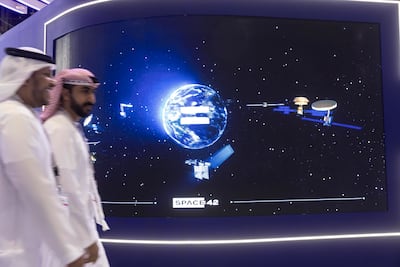Abu Dhabi is in line to become a global player in building Earth observation satellites following a Dh378 million agreement between companies in the emirate.
AI-powered SpaceTech company Space42 won the contract from Fada, a subsidiary of military contractor Edge, which will improve the UAE’s Earth observation capabilities over the next five years.
Space42 will use data from its Foresight constellation of synthetic-aperture radar satellites to provide geospatial analytics to government bodies. This means several government entities would have insights from satellite data that could help them with decision-making in areas like urban planning, environmental monitoring and security.
“Fada's mission to develop sovereign space solutions and drive innovation in satellite systems aligns with this collaboration,” Waleid Al Mesmari, president of space and cyber technologies at Edge, said in a statement.
Space42 was formed after a merger between Bayanat, a geospatial analytics company, and YahSat, creating one of the most valuable publicly listed space companies.
And Fada is a space company launched in September by conglomerate Edge.

The contract announcement came a day after both companies unveiled plans at the Idex defence fair in Abu Dhabi to build an industrial-scale Earth-observation satellite manufacturing centre. Karim Sabbagh, managing director of Space42, told The National that the satellites they develop there will be for dual-use, including commercial and defence.
“The joint venture will be responsible for designing, procuring, deploying and operating these capabilities,” he said.
Beyond manufacturing, the companies will also oversee the entire operational lifecycle of the Earth-observation missions, including deployment into orbit and setting up ground infrastructure that will enable the satellites to capture images and collect data. Engineers at the centre will also build the payloads - the part of the satellite that captures the data.
Once gathered, this data will be processed and analysed for various applications, ranging from environmental monitoring to national security. Mr Sabbagh said the centre would be able to develop many satellites with a mass of hundreds of kilogrammes at the same time.
"Because when you have a larger facility, you can have a larger number of workstations. The industrial flow will have the ability to accommodate a larger volume of spacecraft at any given point in time," he said.
The new project is also expected to increase the number of jobs in the space sector and provide staff with new skills.
"The benefit for the UAE is developing a new cadre of technicians and engineers who have sort of hands-on experience across the entire life cycle of technology development, up to productisation, manufacturing, launch and bring into use and service, which I think is a fantastic sort of achievement," said Mr Sabbagh.
In 2021, The National revealed the UAE's plans to become a regional centre for the development of spacecraft systems.
Sarah Al Amiri, who was the the Minister of State for Advanced Technology and chairwoman of the UAE Space Agency at the time, had said the goal was to increase private sector investment in the country's growing space industry and make it a key contributor to the economy.
"Most of the current space sector within the Emirates is focused on government spending and programmes across both local and federal governments,” said Ms Al Amiri, who is now the Minister of Education.
"Today, we're talking about a space sector that has an indirect impact to the economy. In five years, we want to see a space sector that has both an indirect impact on the economy, society, and also a direct impact on the economy."


